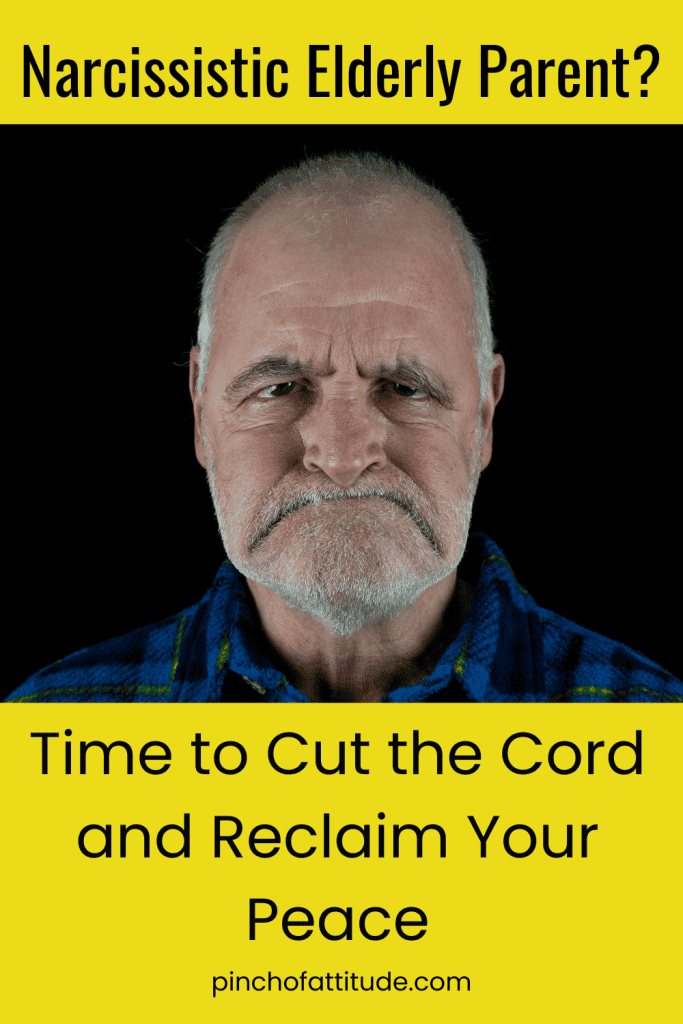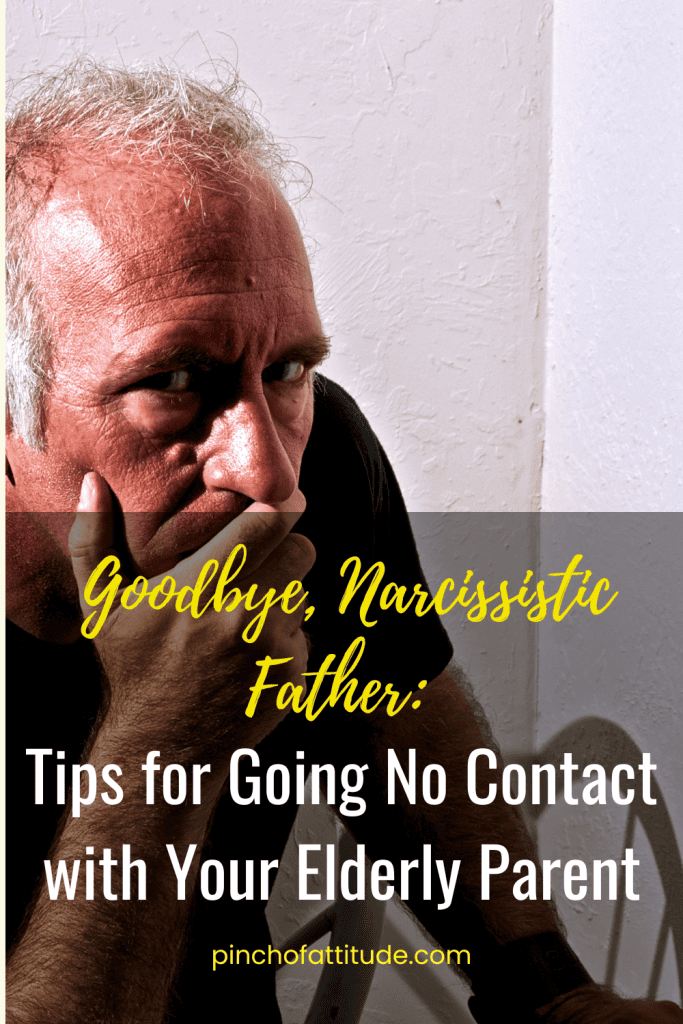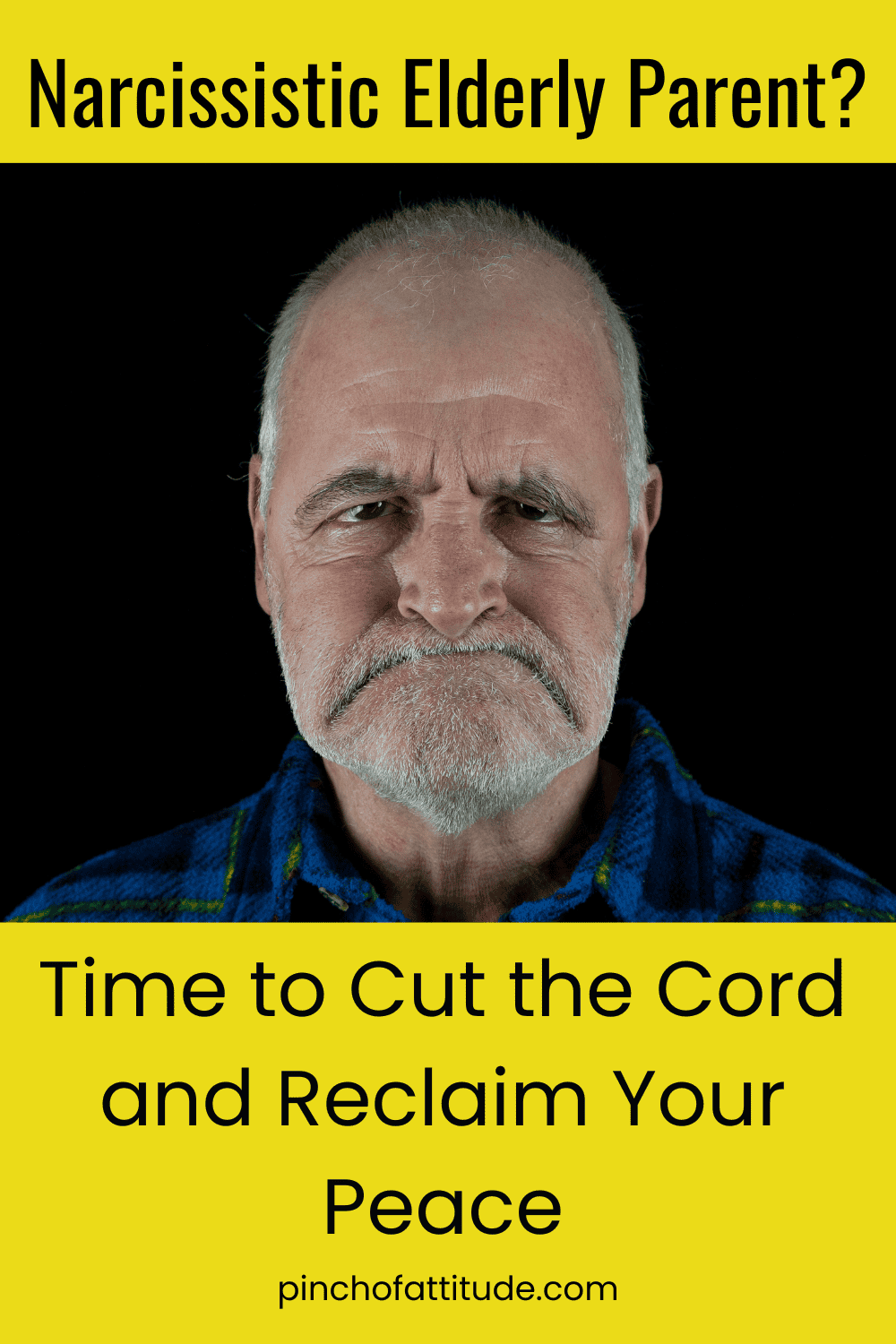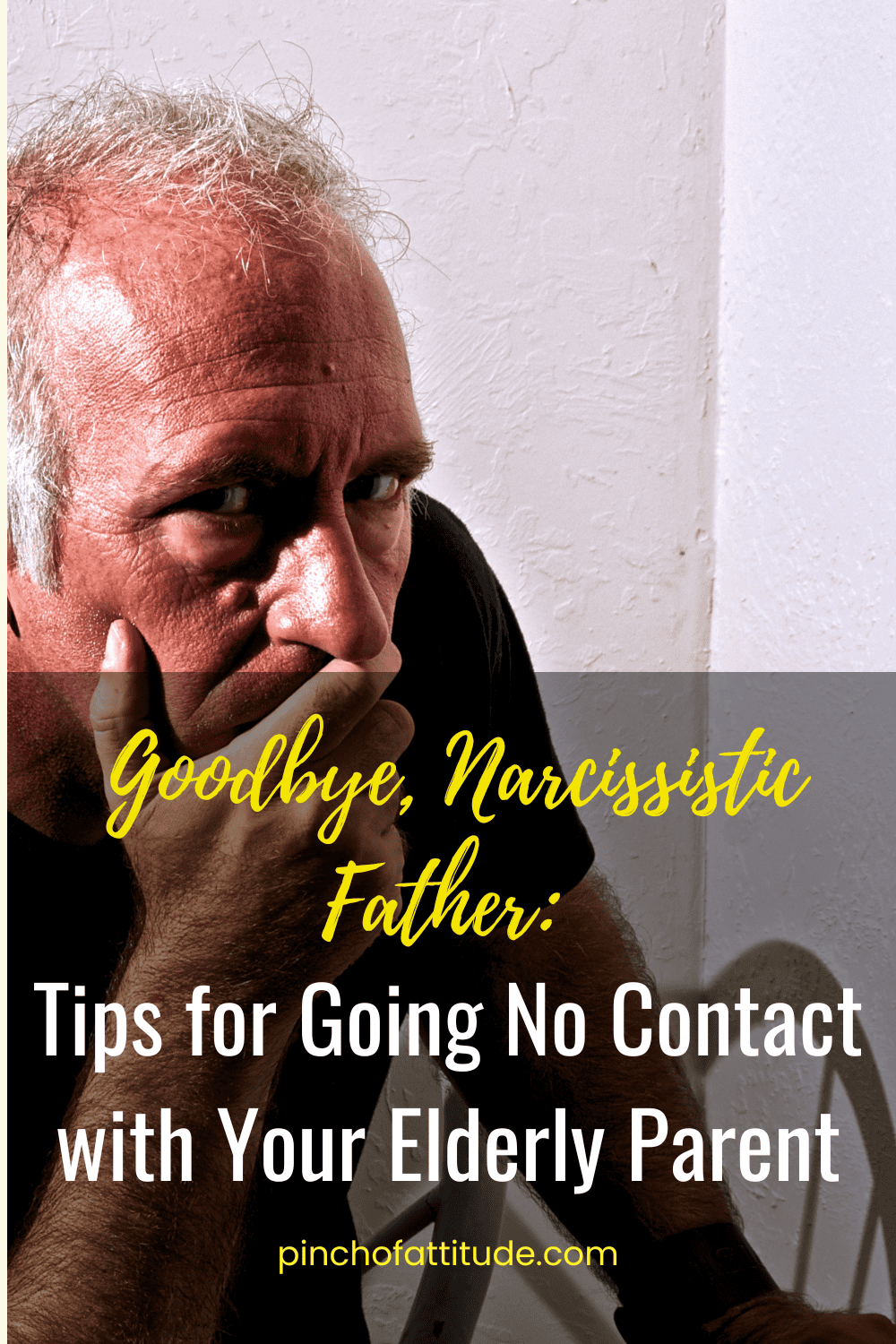Whatever your story, if you’re here, then you’re probably at a crossroads.
Your dad’s getting older, the guilt whispers are coming in loud and clear, and you may be wondering: can I really go no contact with my elderly narcissistic father?
The answer is as messy and nuanced as life itself.
Going no-contact with a toxic parent is not some drastic, cold-hearted move. It’s about protecting your well-being, the hard-won peace you have built after years of tiptoeing around eggshells.
Trust me, I know.
I cut ties with my narcissistic mother years ago, and watching my cousins dance around my narcissistic uncle’s tantrums just confirms – sometimes, distance is the only healthy option.
So, how did I do it?
Below, I’ll talk about the hows and the whys to help you make your way across this complex and often misunderstood path.
- Cutting off contact with your narcissistic father, even if he’s elderly, is about protecting your mental and emotional health. Don’t feel obligated to endure abuse or manipulation.
- Narcissists use guilt and obligation to reel you back in. Remember, you’re not responsible for their happiness or loneliness.
- Surround yourself with people who validate your needs, respect your boundaries, and celebrate your strength.
Table of Contents
13 Steps You Can Take When Going No Contact With Your Elderly Narcissistic Father

Figuring out what to do with an elderly narcissistic father isn’t an easy task.
Based on my experience with my mom, it’s a tug-of-war between feelings of guilt and self-preservation, between societal expectations and emotional sanity.
You may be asking yourself, “How do I get rid of my narcissistic father without feeling like a monster?”
Here are thoughtful and practical steps you can take to navigate this journey with clarity and compassion, both for yourself and your dad:
Step 1: Understand Your Decision
The first thing I did was to understand my decision to go low contact or cut ties completely. I asked myself why I was doing it.
Think back. Does your dad belittle your achievements, twist stories to make himself the hero, or guilt you into sacrificing your needs for his?
Does every conversation feel like a minefield, peppered with emotional landmines disguised as “concern?”
If you answered yes to any of these, chances are, your well-being is taking a serious hit.
Knowing your “why” means you recognize that protecting yourself from further emotional damage is not only okay but necessary.
Tip
Reflect on specific instances of emotional manipulation. When you understand why you’re going no contact, it’ll be easier to finally prioritize yourself.
Step 2: Decide What No Contact Means for You
Of course, the decision to go “no contact” isn’t a one-size-fits-all deal. You get to choose how much contact your sanity needs.
On one end, there’s radio silence – a complete blackout. On the other hand, there may be the occasional birthday card or email. Where do you land?
Think of how much time and attention your dad drains from you. Do visits leave you emotionally exhausted? Do phone calls turn into guilt-fueled marathons?
If so, maybe complete radio silence is your jam. Perhaps you’re okay with the occasional controlled contact, like a once-a-month “How’s the weather?” phone call.
Some even thrive with limited contact, setting firm boundaries during interactions to avoid emotional manipulation.
The key is to choose what feels right for you, not what society or guilt dictates.
Step 3: Inform Your Father of Your Decision
Telling him you’re going to no contact isn’t about seeking approval. It’s about setting boundaries for your well-being.
Imagine it like drawing a clear line in the sand that says, “This far and no further.”
As a fellow adult child of a narcissistic parent, I understand the knots in your stomach and the voice whispering, “Should I really tell him?”
What I learned is that there’s no rulebook for this. Now, the “how” is up to you.
A direct conversation can be empowering, but if that feels like jumping off a cliff blindfolded, a letter or even silence are perfectly valid options.
Choose the method that feels safest and most aligned with your boundaries.
Step 4: Take Practical Steps to Block All Communication
So, you’ve made the decision and set boundaries. Now comes the practical part: cutting all forms of communication.
In my experience, it wasn’t as easy as doing this or that, but you can try doing a couple of things.
Firstly, block his number. The temptation to answer won’t magically disappear, but every ring you don’t hear is a victory for your sanity.
Next, unfriend, unfollow, and block him on every social media platform. For emails, you can either filter all messages from him or block his address entirely.
It’s also important that you be upfront and honest with close family or friends who might be used to relay messages.
Explain your boundaries and ask them to respect your decision.
Tip
Guard your peace and prioritize self-love by surrounding yourself with people who support you. You deserve a family who celebrates your victories.
Step 5: Protect Your Privacy at All Cost
Just because you are related to someone doesn’t mean they get unfettered access to your life. So, aside from blocking all communication, here’s how you can double down on your defense to protect your privacy.
Keep your online life private.
Limit who can see your posts, and be wary of sharing details about your location, relationships, or anything your dad could use to find you.
Be selective about who you share information with.
Having a few trusted friends or family members who understand your situation can be a lifesaver, but remember, not everyone needs to know your battle plan.
Tip
You’re not obligated to share your inner world with anyone who isn’t actively supporting your well-being. You’re an adult with your own life.
Step 6: Build a Life and Environment That Supports Your Decision
Growing up feeling like the unloved child of a narcissistic father can leave bruises on your soul. But you can flip the script and build a life that celebrates you for you.
This isn’t just about your dad anymore. It’s about setting healthy boundaries with everyone who might try to chip away at your peace.
Toxic friends, gossipy relatives, anyone who doesn’t respect your “no contact” choice – they don’t get to have a front-row seat to your healing journey.
You’re not forgetting the past but embracing the possibilities of the future.
Trust me, you’ll see how things bloom beautifully when you give yourself the love and support you deserve.
Step 7: Be Ready for Potential Negative Reactions
I remember when I first cut contact with my narcissistic mother. Her initial reaction was to try and guilt trip me with waves of “woe is me” and “How could you do this?”
Then, there was a brief moment of showing affection and promises, a classic manipulation tactic called love bombing.
She also tried to enlist others (her flying monkeys) to pressure me back into contact.
But know this: These challenges are temporary. Stay strong, trust your decision, and know that every emotional storm eventually passes.
Step 8: Don’t Fall into Guilt Traps
Ah, guilt. The nasty little gremlin that whispers things like, “Maybe you’re being too harsh,” or “Isn’t family forever?”
It’s tough enough cutting ties with a narcissistic parent, but the guilt can feel like an avalanche ready to bury your resolve.
Take my cousins, for example. Their narcissistic father vanished like a desert mirage when they were kids, only to reappear now that they’re successful adults.
Suddenly, he’s all smiles and promises, wanting to be “one big happy family.”
It’s easy to feel sympathy, right? But for people with NPD or narcissistic personality disorder, abandonment often isn’t a mistake. It’s a pattern.
So, before your narcissistic father even tries to guilt trap you, adjust your expectations now. Stop falling for his tricks. You’ve built a life of peace, and you deserve to protect it.
Step 9: Focus on Your Mental and Physical Health
Dealing with a toxic relationship with a narcissist can take a toll on your mental and physical well-being.
Think of it like this: you wouldn’t run a marathon without fueling your body and mind, right? So, treat yourself with the same care and attention.
Eat good food, find activities you enjoy, and hit the gym. Practice meditation, yoga, and deep breathing.
Every healthy habit, every mindful moment, is a step towards reclaiming your power and building a life that truly nourishes you.
Tip
Self-care isn’t selfish. When you nurture your mind and body, you’re building a resilient foundation for lasting peace and happiness.
Step 10: Reflect and Process Your Feelings
Escaping toxic family dynamics is like unwrapping a tangled ball of yarn – messy, emotional, but ultimately liberating.
It was no easy feat, sure, but I realized that I also have to turn inward to reflect and process the journey I’ve taken.
Feel it all – the anger, the sadness, the relief, the confusion. Don’t bottle it up. Let it out in tears, in journaling, in conversations with your support system.
All these are powerful tools to help you come to terms with the past, learn healthy coping mechanisms, and rewrite your narrative.
Step 11: Explore Therapeutic Options if Necessary

Talking to a mental health professional can help you understand the impact of your experiences and unpack any lingering anger, sadness, or confusion.
I choose to look at it like emotional PT.
It strengthens my resilience, helps me learn new coping skills, and allows me to celebrate my victories along the way.
Don’t be afraid to shop around until you find a therapist who feels like a good fit, someone who gets you and your unique journey.
Step 12: Accept and Embrace Your Decision
Remember why you started this journey? It wasn’t to punish anyone. It was to prioritize your health and happiness.
You chose yourself, and that’s a damn powerful choice.
Acceptance isn’t about forgetting the past but about acknowledging it, integrating it into your story, and ultimately, letting it go.
Embrace the journey you’ve walked, the strength you’ve discovered, and the peace you’ve built.
It wasn’t an easy path, but every step took you closer to where you are now – standing tall, free, and finally in control of your narrative.
Step 13: Maintain Your Decision Consistently
Maintaining your decision is about staying firm.
Of course, there will be moments when guilt whispers become louder. But those feelings are normal. Raised by a narcissist, guilt is practically an accessory.
Instead of falling for it, what I did was remind myself why I made this choice.
Revisit your list of reasons (because you probably wrote one, right?) and lean on your support system.
They’re your anchors, your emotional rocks ready to remind you of your strength when the waves get rough.
Tip
Every “no” to contact is a victory for your well-being. Keep your boundaries strong and your head held high.
When Should You Go No Contact With Your Elderly Narcissistic Father?
Deciding when should a narcissistic father be cut off requires careful consideration. Ultimately, it depends on whether your well-being and safety are being consistently compromised by his behavior.
Familial obligation and guilt are understandable, but you also have to prioritize yourself and put a distance between you and the abuser.
While the following are not definitive indicators, here are some red flags to keep in mind:
- Lack of empathy for others and disregard for your feelings: Does your father consistently prioritize his needs and feelings above yours, without showing genuine concern or understanding?
- Narcissistic traits like manipulativeness, gaslighting, and emotional blackmail: Does he use guilt trips, threats, or lies to control you?
- Pattern of abusive behavior: Has he engaged in verbal, emotional, or physical abuse in the past? Is there a risk he might continue to do so, especially in his vulnerable state?
- Inability to respect boundaries: Does he disregard your requests for space or privacy, intruding into your life and decisions?
Remember, you are not obligated to tolerate abusive or manipulative behavior from anyone, not even a parent.
If your father’s actions consistently cause you emotional harm, prioritize your well-being and consider seeking professional guidance.
Consequences You Can Expect After Going No With Your Elderly Narcissistic Father
It’s normal to wonder what happens when you ignore a narcissistic father.
In fact, cutting ties with a narcissistic family member, whether that be your mother or father, shouldn’t be a decision you take lightly.
If you finally make that first step, expect a rollercoaster of emotions. You’ll feel relief, guilt, sadness, and even anger.
But all those times you felt drained, manipulated, or emotionally battered? No more.
Cutting ties creates space for you to heal the wounds of that trauma bond and reconnect with your true sense of self.
As for your dad, he might try to paint you as the villain, the heartless child who abandoned him in his old age.
He may use some friends or family members to act as his messengers to guilt and shame you back into contact.
But this is his playbook, not your reality.
Stay strong, ground yourself in your reasons for going no contact, and don’t let his emotional blackmail derail your progress.
Tip
Expect a range of feelings post-no-contact, but don’t give in to feeling guilty. Remember that your personal healing matters.
Related Posts:
- Cutting Off Your Narcissistic Father: When & How You Should Take Action
- Why Are You So Tired After Leaving a Narcissist?
- Why Grieving After Narcissist Abuse Is Quintessential?
- How to Heal From a Narcissistic Father: 11 Helpful Ways So You Can Start Right!
- How to Escape a Narcissistic Family? My Guide to Your Safety
Frequently Asked Questions
How do you decide if going no contact with your elderly narcissistic father is the right choice?
Going no contact with an elderly narcissistic dad is the right choice when it preserves your mental health, ensures peace, and breaks the cycle of toxic behaviors.
What happens when you have no contact with your elderly narcissistic father?
Cutting ties means denying your father his narcissistic supply. This can trigger frustration, rage, and efforts to regain control through manipulation.
How can you protect your mental health while dealing with your elderly narcissistic father?
To protect your mental health from the effects of your elderly father’s narcissism, prioritize self-care and seek therapy. Distance yourself when necessary.
Can you reconnect with your elderly narcissistic father after having no contact?
Reconnecting after cutting contact with your narcissistic dad is possible. However, make sure you establish clear boundaries and adjust your expectations.
Are there support groups or communities for individuals dealing with elderly narcissistic parents?
Yes, support groups and communities exist for those facing challenges with elderly narcissistic parents. You’ll find them online and in person.





Glad I found your article, I found it empowering as I have gone no contact and am dealing with all you have written about. It’s a roller coaster but your article validates my decision and trauma, so I thank you! Will reread when the “guilt whispers” come around.